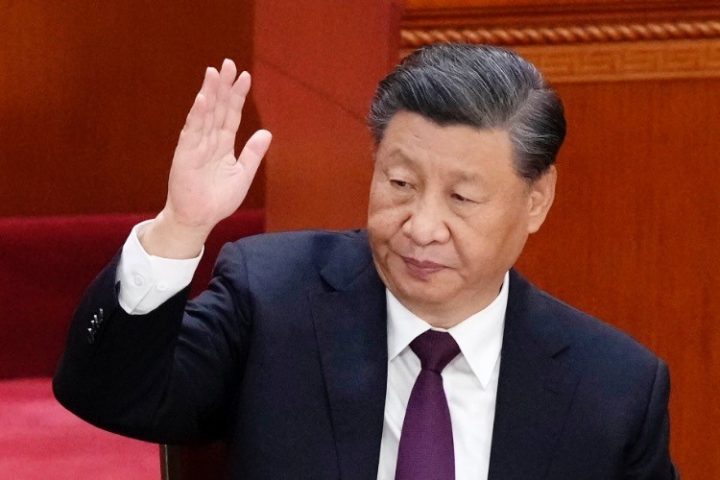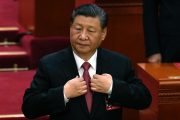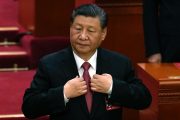
Major amendments were made to the charter of the Communist Party of China (CPC), also called the Chinese Communist Party (CCP), further securing Chinese President Xi Jinping’s grip on power.
Around 2,300 party members on Saturday voted in unison to pass changes to the CPC’s top guiding document after a week-long party congress, held twice a decade in Beijing.
Some of the amendments made include adding “new developments” to Xi’s political ideology, also called “Xi Jinping Thought on Socialism With Chinese Characteristics for a New Era.”
Based on an announcer, one of the changes seems to include the term “two establishments” (liangge queli), which alludes to entrenching Xi’s “core status” in the party as well as ensuring his ideas form the party’s guiding principles.
Also seemingly included was the term “two safeguards” (liangge weihu), which alludes to protecting Xi’s position within the party as well as the party’s central authority.
The announcer justified the changes as vital for the party to “resolve the acute problems and challenges undermining its long-term governance, the security and stability of the country, and the well-being of the people.”
Another important change was how delegates concurred on incorporating the phrase “resolutely oppose and deter separatists seeking ‘Taiwan independence’” into the party charter.
Regarding Chinese resistance to Taiwanese independence, observers note that the aforesaid phrase mirrors Xi’s resolve to ensure that reunification with Taiwan becomes part of his legacy.
During his closing speech, Xi indicated that the amendments “set out clear requirements for upholding and strengthening the party’s overall leadership.”
Since its establishment in 1921, the CPC has amended its charter at each party congress to mirror its developing political doctrines and guidelines.
For example, the most recent congress in 2017 saw the charter amended to include Xi’s political ideology.
Xi is the second leader, after Mao Tse-tung, to have his political doctrine incorporated in the charter while still in power. Hence, the latest changes reflect Xi’s firm grip on power and leadership of the party. Observers have pointed out that Xi has further entrenched his already-significant clout and secured his influence. Therefore, resistance to Xi would become more challenging, as differing viewpoints could be perceived as undermining the CPC itself.
That being said, concentrating considerable power and authority on one man is dangerous, according to political analyst Willy Lam, an adjunct professor at the Chinese University of Hong Kong.
“The risk is that if Xi makes a dubious or a wrong decision, there would be nobody powerful enough to correct him. For example, if he wants to invade Taiwan, or to do something hawkish and against the Western alliance led by the United States, nobody can stop him,” added Lam.
Associate Professor Alfred Wu from the Lee Kuan Yew School of Public Policy said the recent changes reflect a shift toward a “one-man rule” within the CPC, with a personality cult surrounding Xi.
“If we look at the history of the People’s Republic of China, particularly the later years of Mao Zedong, a lot of disasters happened because there were no checks and balances and Mao appointed a lot of his supporters to leadership positions,” said Wu.
To boot, congress delegates and journalists witnessed some drama at the typically uneventful closing session of the congress on Saturday.
Around 11:00 a.m., as top leaders such as Xi sat on the stage at the Great Hall of the People, observers noticed that two men were seemingly trying to convince former leader Hu Jintao, 79, to leave the venue. Hu appeared unwilling to leave, despite one of the men pulling him up from his chair. Before being escorted off the stage, Hu said something to Xi, who nodded. He also appeared to have said something to his protege, Premier Li Keqiang, and patted him on the shoulder.
Some speculate that Hu, supposedly suffering from poor health, had perhaps left because he was unwell. No reason was provided for Hu’s departure. Chinese media platforms also remained silent on the affair.
On a deeper level, this little episode reveals an insight into internal party dynamics, amid the increasingly opaque nature of Chinese elite politics under Xi, who has cracked down on leaks beyond the party.
Besides, four of the current seven supreme leaders ruling China, such as Premier Li Keqiang and fourth-ranked Wang Yang, are expected to retire in a significant reshuffle that will enable Xi to rule amid his allies.
The departure of the four top leaders, together with the retirement of third-ranked Li Zhanshu, 72, and seventh-ranked Han Zheng, 68, permits Xi to fill the Politburo Standing Committee — the center of political power — with his supporters, based on analysts.
Li’s and Wang’s names were not present in a list of the newly elected 20th Central Committee of the CPC on Saturday (October 22). The new cohort of leaders — 205 full members and 171 alternate members — hail from the top echelons of the party, military, and government.
Observers regard Li’s and Wang’s retirements as a dent to the Communist Youth League faction, to which the two men, along with Hu, belong. Neither Li nor Wang is of retiring age for Politburo members. Both are 67.
Yet an informal retirement norm, otherwise referred to as the “seven up, eight down” rule, defines the age limit at 67 for old and new members of the Standing Committee and the broader Politburo when a new term begins. Politicians aged 68 or older are eligible.
Wang was expected to take over from Li as the next premier. Li was speculated to have asked to retire because of health reasons.
“It’s very rare for any leader to stay in the Politburo for four terms, or 20 years, with the paramount leader being the exception. Li and Wang have already been in the Politburo for three terms, so it is difficult for them to stay on,” said Dr. Chen Gang, a senior research fellow at the East Asian Institute in Singapore.
Other leaders slated to retire include economic czar Liu He, 70; top diplomat Yang Jiechi, 72; vice-premier Sun Chunlan, 72; head of the Communist Party’s organization department Chen Xi, 69; and ex-Xinjiang party chief Chen Quanguo, 66.
Meanwhile, Xi would probably fill the vacated seats in the Politburo Standing Committee from this pool. “Under Xi’s unified army, the next problem is how they show their loyalty to Xi. They are competing with each other to show loyalty to Xi, which may stimulate unnecessary rivalry and activism in the leadership,” said Assistant Professor Lee Jonghyuk at the S. Rajaratnam School of International Studies.



